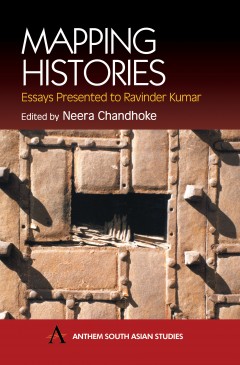Mapping Histories
Essays Presented to Ravinder Kumar
Edited by Neera Chandhoke
Other Formats Available:
- About This Book
- Reviews
- Author Information
- Series
- Table of Contents
- Links
- Podcasts
About This Book
Edited by Professor Neera Chandhoke, 'Mapping Histories' is a fitting tribute to renowned historian Ravinder Kumar, well known for his pioneering work on the social consequences of colonial rule in India, and for founding the Centre for Contemporary Studies at the Nehru Memorial Museum and Library. Here, Fellows of the centre present a collection of historical and contemporary studies on India, which deal with diverse themes from religion to the environment, cultural studies to feminism. Together, these lively and challenging essays offer readings on how we understand India's history and, conversely, how we can use this comprehension of the past to interpret India's complex present.
Reviews
Author Information
Neera Chandhoke is Professor of Political Science at University of Delhi. She was a Jawarharlal Nehru Fellow at the Centre for Contemporary Studies, Nehru Memorial Museum and Library, New Delhi, between 1997–99.
Series
Anthem South Asian Studies
Table of Contents
Preface; Ravinder Kumar; Kalidasa in the Nineteenth Century in Europe and in India; Is Buddhism the Answer to Brahminical Patriarchy?; The Story of Draupadi's Disrobing: Meaning for Our Times; Tracing Akbar: Hagiographies, Popular Narrative Tradition and the Subject of Conversion; The Homogeneity of Fundamentalism: Christianity, British Colonialism and India in the Nineteenth Century; Colonial Construction of a 'Criminal Tribe': The Itinerant Trading Communities in Madras Presidency; Houses by the Sea: State Experimentation on the Southwest Coast of India 1760-1800; Competitive Advantage through Contestation: The Indian Shop-floor at the turn of the Century; Less-than-Total Unities: Patel and the National Movement; Foreshadowing 'Quit India': The Congress in Uttar Pradesh 1939-1941; Some Reflections on the Partition of India 1947; Fifty Years On: Decolonization in Asia and Africa; Sovereign Subject: Ray's Apu; Education and Society in Post-Independence India: Looking towards the Future; The Body in the Mirror: Women and Representation in Contemporary India; Beyond State and Market: THe Indian Environmental Debate; Vocabularies of Resistance, Vocabularies of Rights; The Efficacy and Ethics of the International Political Terrorist Act or Event; Contributors; Index
Links
Stay Updated
Information
Latest Tweets



